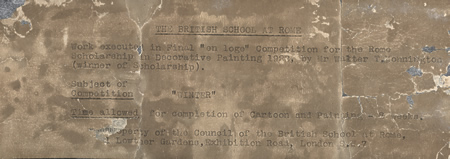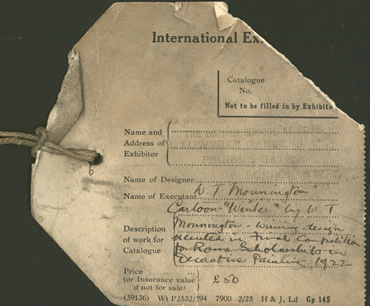

 Hover over the painting to magnify (there may be an initial delay while the magnified image is loaded)
Hover over the painting to magnify (there may be an initial delay while the magnified image is loaded)Sir Thomas Monnington (1902-1976):
Cartoon for Winter, circa 1921
Framed (ref: 229)
Chalk and gouche on brown paper
48 x 85 in. (122 x 216 cm.)
See all works by Sir Thomas Monnington chalk 1.Master Drawings
Provenance: The British School at Rome, Lowther Gardens, London; Sotheby�s, London 14th October 1987.
Exhbited:
Exhibition of works submitted in the final competitions for the Rome
Scholarship of 1922, Royal Academy, February 1922; International
Exhibition of Modern and Decorative Industrial Art, Paris, April-October
1925, British Section, Grand Palais (309).
Literature: Illustrated London News, 10th March 1923, Vol 162, p. 366, (finsihed painting reproduced); Sam Smiles, Inspired by Italy, Exeter Museum and Art Gallery, August - September 1996; British Murals and Decorative Painting 1920-1960, Sansom & Co, 2013


Winter was Monnington's winning submission for the 1922 British School at Rome Scholarship in Decorative Painting. The landscape is based on studies looking towards Clerebury Rings near Salisbury, undertaken during visits in 1921 to the artist's cousin Dr. R.C Monnington. In a review in the Observer, (22nd February 1922), P.C. Konody praised Monnington's painting for being 'steeped in the best traditions of the Italian Renaissance. His colour is dull, but there is a marked sense of style in his design'. A link with the Italian Renaissance can be demonstrated more specifically in relation to the work of Piero della Francesca: the young peasant leaning with both hands on a spade is a possible echo from the Discovery and Proving of the True Cross (San Francesco, Arezzo). The man sitting on a rock in the middle of the composition appears to be based on the figure of St. Joseph (in reverse) in Piero della Francesca's Adoration. I am grateful to Professor Luciano Chelles for these observations.
 Rome Scholars
Rome Scholars SOLD
SOLD




